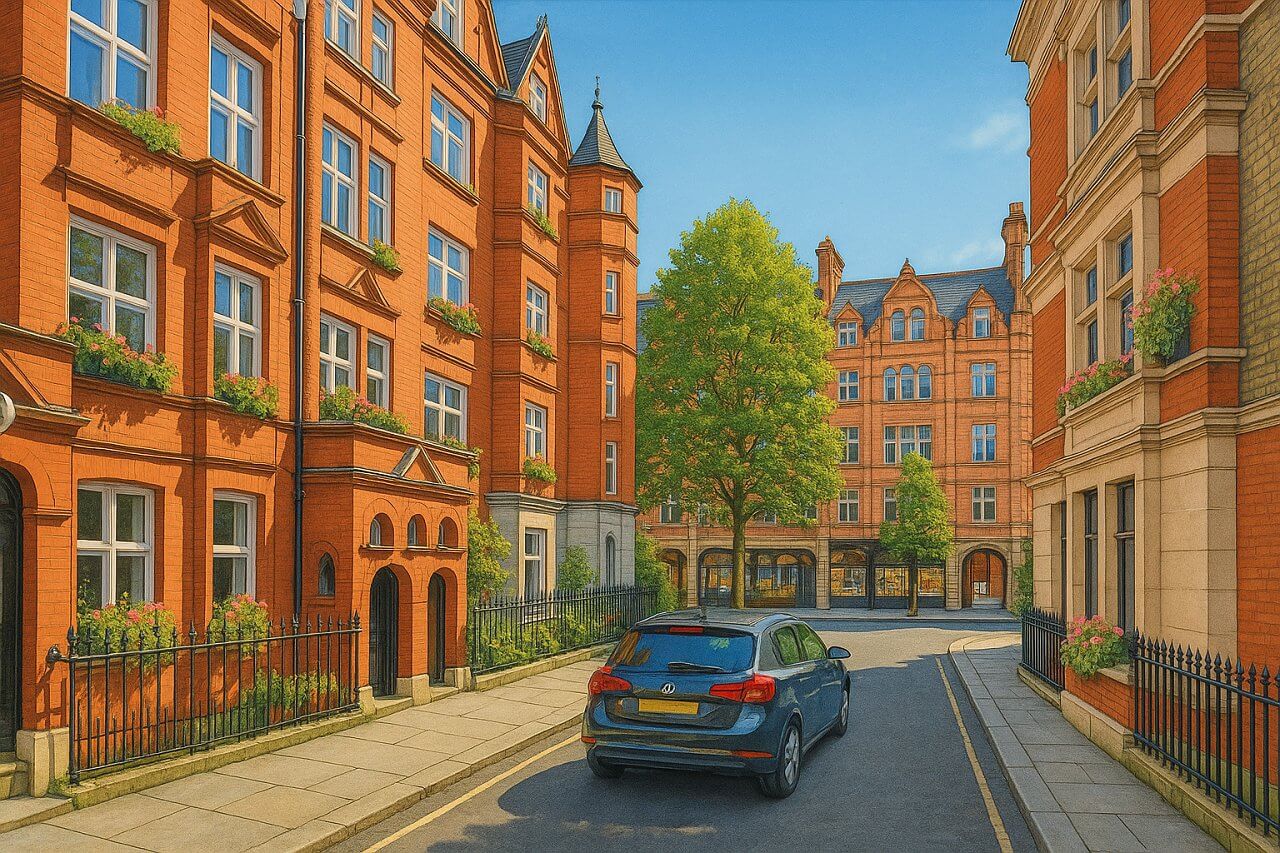
Carpenter Street, London
Carpenter Street is a small and secluded street located in the heart of Mayfair, one of the most prestigious districts in the City of Westminster, London. Running from Mount Row in the north to Mount Street in the south, this short street is known for its discrete elegance and exclusive residential character. It forms part of a quiet network of back streets nestled among the grand architecture and luxury establishments of central Mayfair.
Street Layout and Surroundings
Carpenter Street is just over 100 metres in length and functions as a pedestrian-friendly lane with limited vehicular traffic. The atmosphere is notably serene, in contrast to the busier roads around it. To the north, it connects to Mount Row, a narrow passage behind Grosvenor Square. To the south, it meets Mount Street, a wider, more prominent road known for its historic buildings and high-end shops.
The immediate area features a mixture of elegant 19th-century townhouses and modernised residential blocks. The street is framed by tasteful brickwork façades, some with decorative Georgian elements, giving it a timeless appearance. This understated charm makes it attractive to residents seeking privacy amid central London’s affluence.
Historical Background
Carpenter Street likely dates from the mid-to-late 19th century, developed as part of the grand expansion of Mayfair under the stewardship of the Grosvenor Estate. The street’s creation followed the transformation of Mayfair from a semi-rural area into one of London's premier residential districts. By the 1860s, much of the surrounding urban fabric, including Mount Street and Carlos Place, had been laid out in its present form.
Origin of the Name
The origin of the name Carpenter Street is not entirely documented, but it is assumed to be linked either to a former landowner, developer, or possibly a tradesman who worked on or lived in the area during its development. Streets in Mayfair were sometimes named after builders, artisans, or architects involved in the Grosvenor Estate’s building projects. Unlike some other streets in the vicinity, the name does not appear to derive from aristocratic heritage.
Nearby Points of Interest
Though Carpenter Street itself is quiet and residential, it benefits greatly from its central location. A short walk brings visitors to:
- Grosvenor Square – A historic garden square just to the northwest.
- Mount Street Gardens – A secluded public garden just across Mount Street.
- The Connaught Hotel – A world-renowned luxury hotel located nearby on Carlos Place.
- South Audley Street – Lined with luxury boutiques and refined eateries.
With Hyde Park also less than 10 minutes’ walk away, Carpenter Street offers tranquility within easy reach of some of London’s grandest urban experiences.
Property and Real Estate
As of mid-2025, residential property prices on Carpenter Street remain exceptionally high, in line with the rest of Mayfair. Flats here typically sell for between £2,000 and £2,500 per square foot (£21,500–£27,000 per sq metre), depending on the floor level, view, and interior design. A well-finished two-bedroom flat of around 1,000 sq ft (93 sq m) might command between £2 million and £2.5 million.
The properties are typically leasehold apartments in refurbished period buildings or bespoke private residences. Very few properties come onto the market here, and when they do, they are snapped up by affluent buyers seeking discretion and prestige in central London.
Transport Links
Nearest London Underground Stations
Carpenter Street benefits from excellent access to the London Underground system, with three major stations nearby:
- Green Park Station (Jubilee, Piccadilly, Victoria lines) – approx. 10 minutes’ walk east.
- Hyde Park Corner Station (Piccadilly line) – approx. 10 minutes’ walk south.
- Marble Arch Station (Central line) – approx. 12 minutes’ walk northwest.
These stations connect Carpenter Street with major transport hubs, shopping destinations, and tourist sights across London Underground Stations.
Bus Services
Nearby bus stops along Park Lane, Oxford Street, and Piccadilly serve numerous routes, offering connections to destinations across central London. Routes such as the 2, 10, 16, 36, and 73 all stop within 5–10 minutes’ walk from Carpenter Street.
Fun Fact
Carpenter Street is a favourite among international buyers and ultra-high-net-worth individuals seeking a "lock-up-and-leave" pied-à-terre in the heart of London. Because it’s so low-profile, the street is often overlooked by tourists, making it a hidden gem in an otherwise high-profile postcode.
Quick Facts
- Location: Mayfair, City of Westminster, London
- Connects: Mount Row (north) to Mount Street (south)
- Nearest Tube Stations: Green Park (Jubilee, Piccadilly, Victoria), Hyde Park Corner (Piccadilly), Marble Arch (Central)
- Nearby Bus Routes: 2, 10, 16, 36, 73 and others along Park Lane and Oxford Street
- Local Highlights: Grosvenor Square, Mount Street Gardens, The Connaught Hotel
- Average Property Price: £2,000–£2,500 per sq ft (£21,500–£27,000 per sq m) as of 2025
- Typical Property Size: Around 1,000 sq ft (93 sq m) for two-bedroom flats
- Character: Quiet, discreet, and highly exclusive residential street
- Historical Era: Likely developed mid-to-late 19th century as part of the Grosvenor Estate
Map of Carpenter Street, London
 Painting of Carpenter Street, London
Painting of Carpenter Street, London